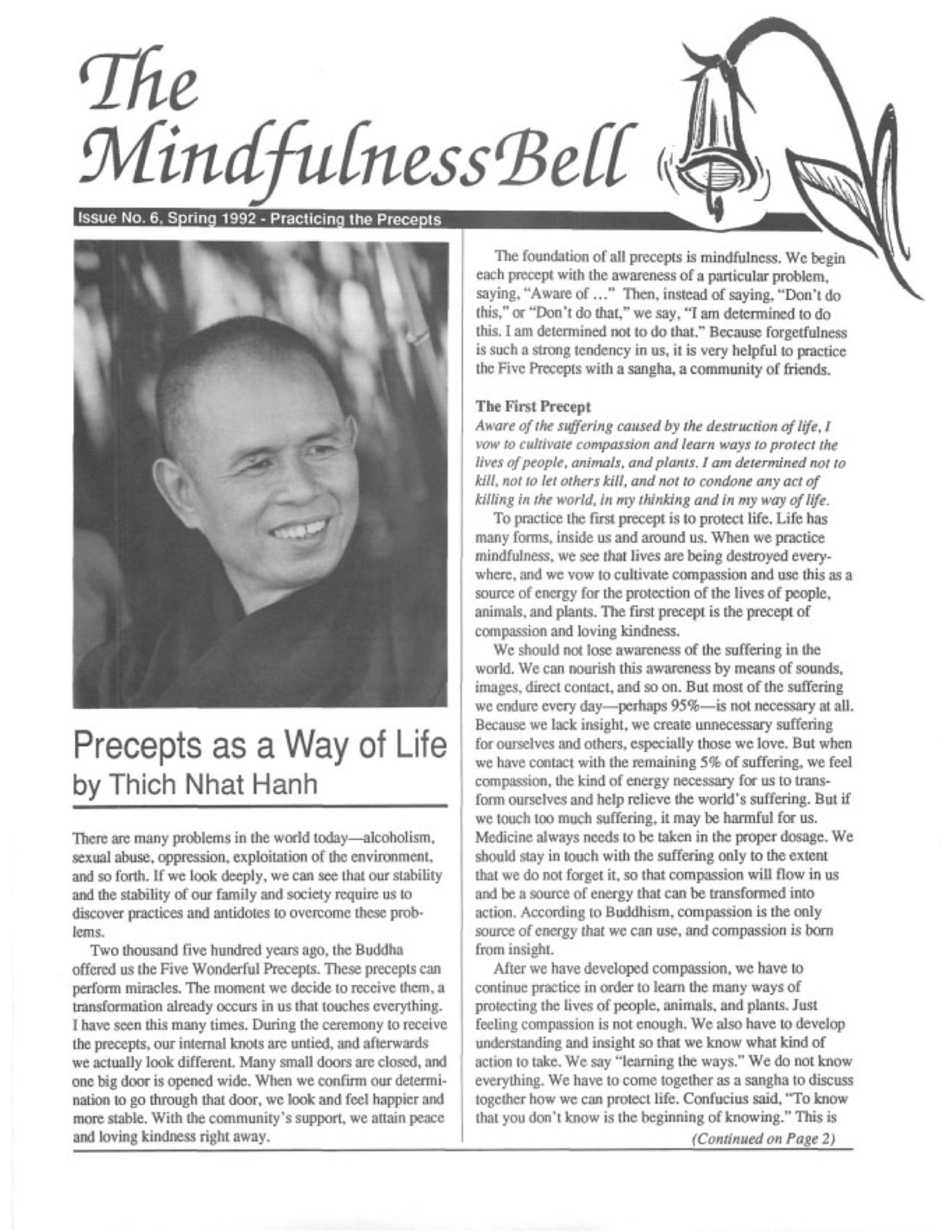By Barry Denny
The emotional intensity I experienced during one of the group discussions at the Omega Mindfulness Retreat in June 1991 stunned me at first and then led me to reflect on the nature of American Buddhism. Let me describe the incident, as well as some of the feelings and thoughts it generated.
The two-day discussion group focused on individual and societal toxins and the antidotes to these toxins. During the first day, I felt close to several group members and wished I might melt barriers and establish more lasting connections with them.
By Barry Denny
The emotional intensity I experienced during one of the group discussions at the Omega Mindfulness Retreat in June 1991 stunned me at first and then led me to reflect on the nature of American Buddhism. Let me describe the incident, as well as some of the feelings and thoughts it generated.
The two-day discussion group focused on individual and societal toxins and the antidotes to these toxins. During the first day, I felt close to several group members and wished I might melt barriers and establish more lasting connections with them. The feeling was real but fragile. The next day a number of participants described their personal toxins (destructive or negative behaviors) as rooted in their German heritage—too rigid and judgmental. By coincidence, eerie quirk of fate, or karmic need, my group contained an unusually high proportion of members with at least one German parent. As more people spoke about their German heritage, a camaraderie among them seemed to be developing. I began to feel anger, sadness, and confusion arise in me. "How bizarre," I thought, "here I am, a Jew who was never bar mitzvahed, who has rarely thought about the holocaust, and who has viewed my relatives who would die before buying a Volkswagon as crazy, sitting here in a mindfulness retreat identifying with murdered shtetl dwellers and fierce hatred for their executioners." Clearly I didn't feel anger towards any individual in the group, but together they triggered primal ethnic and religious emotions. I tried to breathe and be mindful as I watched my rage intensify. Unable to contain my anger and sadness, in tears, I revealed my feelings to the group. People were very supportive. Neither I nor any group member was directly involved in the Holocaust, yet on some level a small reconciliation was achieved.
An environment of compassion and mindfulness offered an opportunity for understanding and closure. Perhaps this could have been anticipated in a setting designed to encourage awareness of our thoughts and actions. But harder to fathom was the depth of feeling generated in the group. These feelings reflected both the positive sense of belonging to a distinct ethnic group with its own food, literature, and language, and also the possessive, dualistic sense of "my culture versus yours."
Another Jewish group member recalled a childhood experience. His father told him that all Germans should be killed. The youngster asked about those who were children during the Third Reich, or, perhaps, not yet born. His father said, "They too should be killed." The son said, "Then you're as bad as Hitler," and his father slapped him on the face. This seemed like a variation on interactions I had with my own father. The hatred projected outward was so familiar.
An Irish-American group member told me that he grew up thinking that the British were evil incarnate. His father's reality became the family gospel. A friend I've known since the fifth grade was inculcated with the reverse side of this ethnic animosity. Coming from a family of Protestant Northern Irelanders, his father considered "the Roman Papists" as "pigs."
A lunchtime conversation with a Chinese-American woman on the final day of the retreat revealed another example of buried seeds of strong ethnic feelings emerging in an unexpected situation. This woman was a member of an Asian women's group. During a meeting she suddenly became aware that most of the women were Japanese, and she no longer felt connected. So much pain had transpired between these two cultures, much like the conflict situations in Yugoslavia, Iraq, India, South Africa, Italy, and various New York City neighborhoods.
There are many discussions these days about the future manifestations of American Buddhism. Buddhism has always adapted itself to the host culture. But what is the prevailing American culture? We stem from diverse racial and ethnic groups. Each group has its unique heritage—a set of values and myths that express the highest ideals of the group, as well as a dark side containing age-old prejudices and bottled-up destructive forces. The stillness of meditation is likely to bring this racial unconscious (to use Jung's terminology) to the surface. An American sangha consisting of people from varied backgrounds offers the possibility of new ways to reflect on the Dharma. Conversely, a multicultural sangha presents us with obstacles such as the possibility of relating from an ethnocentric vantage point or from the most negative aspect of a particular culture.
My wife is Irish. I'm Jewish. My two daughters have not been given a great deal of concrete ethnic or religious transmission from either culture, only what is revealed in our bones, in our very being. My seven-year-old daughter, Rachel, recently told my wife, "Mommy, the Holy Land must be very beautiful. Only there's one problem—the bombs." It seems that each of us has an ethnic Holy Land, Heaven, or Pure Land within us. The navel of the Earth is in our belly as well as atop the holy mountain. A bomb also ticks in that sacred spot. Call it Hell, mental illness, or ignorance. I can only honor my ethnic roots. They are part of my history and therefore beautiful. They are part of my history and therefore ugly. Paraphrasing Thay, our negative, or ugly seeds need to be transformed by mindfully watering the beautiful ones and tenderly observing those that are destructive.

Barry Denny lives in New York City.

